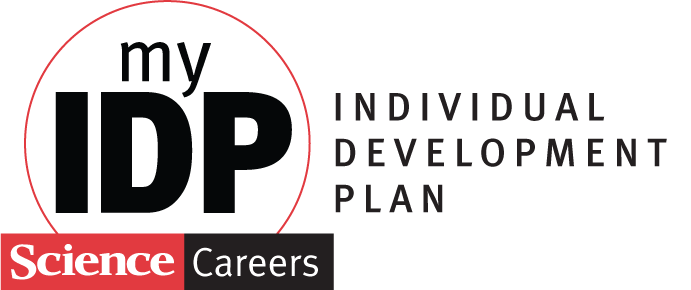Create your Individual Development Plan
Read a "Quick Guide to IDPs" customized for faculty.
Consider the benefits of planning
What is an IDP?
How can the IDP process help me?
What are UMass Chan institutional expectations regarding IDPs?
Resources for help creating your IDP
Suggestions as you develop your IDP
Consider the benefits of planning
- Research demonstrates that people who incorporate deliberate career planning into their professional lives achieve higher success, in both objective and subjective measures—within science and in other fields.
- Faculty, leaders, and funders promote career planning for scientists (Science editorial, NIH Biomedical Workforce Report, ASCB article by Morningside Graduate School of Biomedical Sciences faculty)
What is an IDP?
An Individual Development Plan is a set of goals for the next 6-12 months intended to advance your career development that includes:
- Research project goals (e.g., research milestones, papers, presentations)
- Skill development goals (e.g., research skills and knowledge, professional skills, and career-specific skills)
- Career advancement goals (e.g., learning about career options, building a professional network specific to top-choice paths, updating CV)
Your IDP should include goals to help you succeed as a graduate student. Include milestones you hope to reach this year in your research, skills you need to develop to succeed in your research, and science-specific knowledge you would like to gain.
Your IDP should be informed by your long-term career goals. In addition to your “Plan A” career path, it is wise to be well-informed about a “Plan B” career path—in case your career interests change, or in case things out of your control (for example, limited job availability or geographic constraints) require you to change course.
How can the IDP process help me?
- See the big picture. Creating an IDP begins with self-reflection on progress to date and assessment of what needs to be accomplished next. It's a valuable opportunity to stop and see the forest through the trees.
- Get you down to specifics, clarifying your goals.
- Focus your efforts. To make your plan realistic, you need to prioritize.
- Empower you to be proactive in your own goal setting and development. You initiate and oversee the process of self-assessment and planning.
- Help you consider resources and mentoring necessary to help you achieve your goals.
- Provide a framework for conversations with your mentors, helping to clarify expectations, get advice, and receive feedback. Because the IDP includes research-related goals, it will you prepare for meetings with your research advisor and Thesis Research Advisory Committee (TRAC). It also provides a framework through which mentors can give feedback on professionalism and skills.
- Prepare you to take advantage of lucky opportunities, and say “no” to others. By defining your priorities, you will be better able to recognize lucky opportunities and consider how to revise your plan to fit them in. Your IDP is also the rationale for declining opportunities (or requests) that could derail goals you feel are higher priority.
- Increase efficiency and productivity… in both your research and career development. Data from Sigma Xi indicates that postdocs who create and discuss a plan tend to have higher publication rates and higher satisfaction with the postdoctoral experience.
What are UMass Chan institutional expectations regarding IDPs?
Students
- See the GSBS Career Development Center to access the GSBS IDP portal in Canvas.
- Third-year students in the Basic Biomedical Sciences will be guided through the process of creating an IDP in a mini-course offered by Dr. Cynthia Fuhrmann. Course information will be sent to students directly.
- Attain individual feedback through the GSBS Career Development Center.
Postdocs
- As approved by Chairs’ Council, all postdocs will receive brief training in creating an IDP as part of the course, Responsible Conduct of Research, which is required for all postdocs within 3 months of hire.
- Postdocs are encouraged to draft an IDP annually and discuss their goals with their research advisor and other mentors, including professionals with in-depth knowledge about the career paths the postdoc is targeting.
Resources for help creating your IDP
- myIDP is an online career planning tool hosted by ScienceCareers and AAAS. This free, self-explanatory website will walk a student or postdoc through the process of creating an IDP.
- Refer to the myIDP Content Collection--a set of articles providing suggestions for each stage of creating an IDP.
Suggestions as you develop your IDP
- Request feedback from mentors and peers to more accurately assess both your strengths and areas for growth. Consider your research-related skills as well as professional skills such as writing, presentation, interacting with colleagues, giving and receiving feedback, and leadership. Ask for specific examples, which can be very informative. You can download a skills assessment form from myIDP to print and give to mentors.
- Ask your mentor(s) for advice on whether your IDP goals are attainable and realistic. Goal-setting is a skill, and it can take years of practice to set appropriate short-term goals.
- Be open to and well-informed about multiple career paths. Your career interests and life circumstances can change. And, all careers are highly competitive—within academia and beyond. Set goals to develop your career-related knowledge, skills, experience and network in a way that will position you to be competitive for more than one career path.
- Seek additional mentorship on your career-related goals. Additional conversations with scientists in your careers of interest will help you learn about the career, set realistic and appropriate goals, and build your professional network.
- Attend conferences and other networking opportunities within your career paths of choice. The Morningside Graduate School of Biomedical Sciences expects research advisors to fund student and postdoctoral attendance to conferences in the field of their current research group. Starting in 2015, students and postdocs can apply for Professional Development Scholarships to fund travel and fees for uniquely valuable opportunities outside of your current field.
- Schedule a confidential appointment to discuss specific issues that arise as you develop your IDP.

